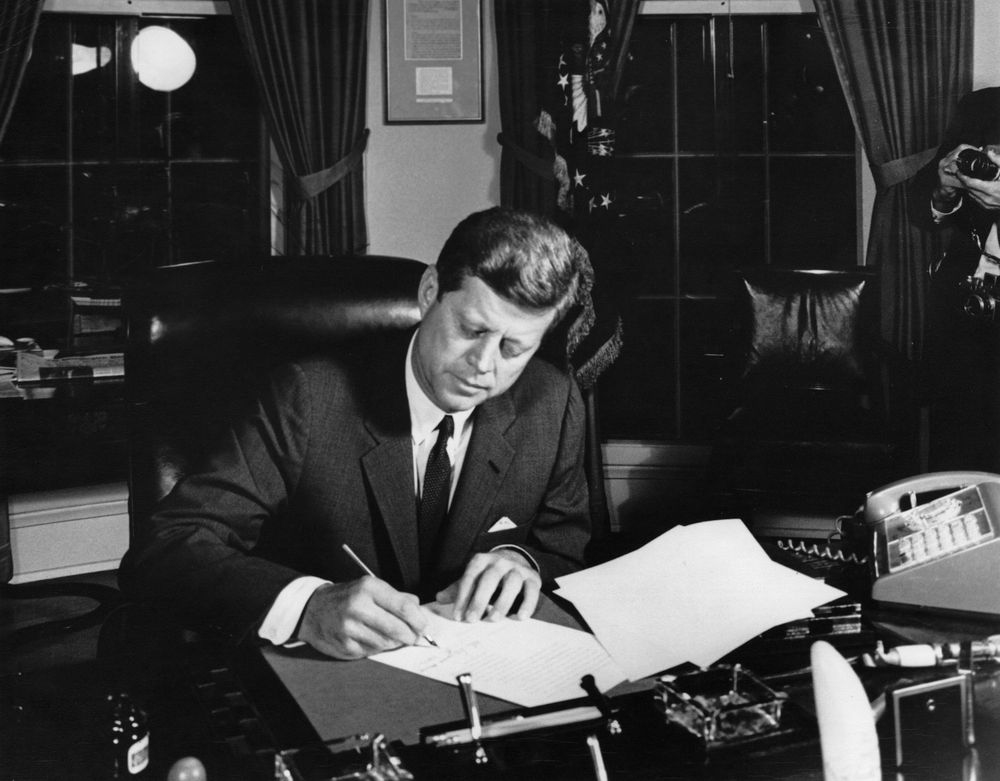 Executive Office of the United States
Executive Office of the United States
Post-INF: Putin Ready for New Cuban Missile Crisis
On February 20th, President Vladimir Putin delivered his state-of-the-nation speech, in which he threatened the United States and promised quality-of-life improvements to the Russian people.
Putin asserted that if the United States deployed nuclear missiles in Europe, Russia would be forced to aim its nuclear weapons at these missiles and at the United States itself—though he was clear that Russia is not seeking out direct confrontation. Days after the speech, he followed up by saying Russia was prepared for a Cuban Missile Crisis level of confrontation, threatening to deploy hypersonic missiles on ships or submarines, if the U.S. “wants that.” These threats are coming about after both the U.S. and Russia suspended the 1987 Intermediate-range Nuclear Forces Treaty in early February.
Considering Russia’s growing pile of domestic issues, such as widespread “trash protests,” heavy blows to pensioners, and the glaringly obvious impact of climate change, all of which have led to increasing levels of public distrust in Putin, one has to wonder whether Putin is actually threatened by the U.S. or if he’s simply using it as a scapegoat.
These threats against the United States came after a long list of promises, including higher public benefits, salary and wage increases, and lower taxes for mothers with more children. Putin also promised some potential solutions for the issues listed above, such as better garbage collection methods and a “new national brand of green consumer products,” according to The New York Times. All of these spending initiatives are piling up to create a substantial bill for Russia, and no one is quite sure how it will pay.
Putin’s government literally can’t afford to fulfill all his promises to the Russian people, and he definitely can’t afford an arms race stemming from nuclear saber-rattling with the U.S.
Russia has previously emphasized its willingness to resume talks to save the INF, but its clear, long-standing violations of the treaty since the Obama administration have led the current administration to start backing away completely. After withdrawing, Washington made clear it would start research and development on new systems. National Security Adviser John Bolton even said “we’ll soon be seeing missiles in Europe,” according to The Guardian. It was these statements that sparked Putin’s direct animosity towards the U.S.
Putin’s method of signaling, which in this case involves directly threatening the United States, essentially knocks out two birds with one stone. First, he relieves himself of some of the pressure from his own electorate. Public trust in Putin recently hit a 13-year low (33.4%), and his approval rating, which has been as high as almost 90%, is now at just over 60%. These factors are likely a result of the struggling Russian economy and Putin’s failure to keep key promises. By acting aggressively internationally, Putin tends to accumulate both popularity and trust—his trust rating hit a high of 71% just after Russia annexed Crimea in 2014. His boisterous rhetoric also might help distract from the fact that he likely can’t pay for the salary and pension increases he’s promised.
The second “bird” is strategic. The U.S. pulled out of the INF and could potentially develop new intermediate-range weapons, perhaps placing them in Europe; if Putin promises a direct retaliatory response to these potential actions (which he did in his recent speech), he reduces the likelihood the U.S. will take them. He also gets to hold onto Russia’s 9M729 cruise missile, which the U.S. previously found to be in violation of the treaty.
Russia’s development of the 9M729 before the U.S. withdrew from the INF was largely the reason for the U.S. withdrawal. The ground-launched 9M729 is believed to have an intermediate range (between 500 and 5,500km), and though the official reasons for Russian development of it are unclear, the missile is difficult to trace and could potentially help Russia in deterring Asian aggression.
Mainly, in a world without INF, Russia is back to trying to “win” Cold War-style faceoffs with the United States, which explains Putin’s recent aggression. The saber-rattling and back-and-forth threats to deploy new missiles is not only dangerous, but detrimental to the build-up of ideals around bilateral nuclear security. There is no INF revival on the near horizon.






